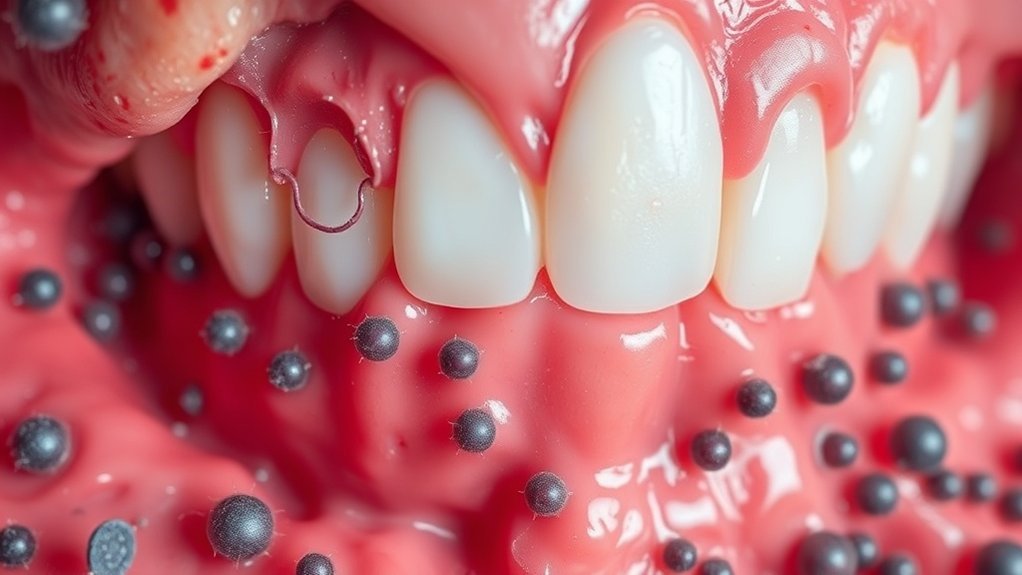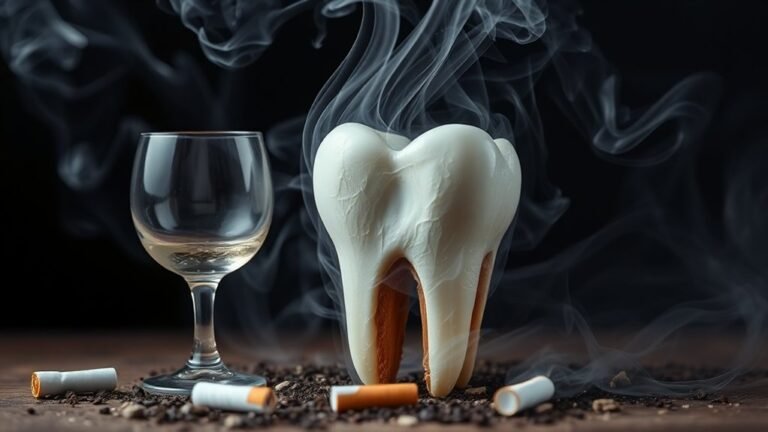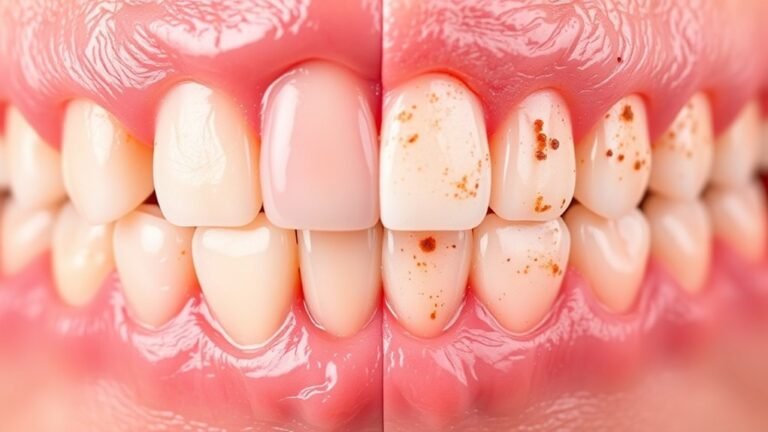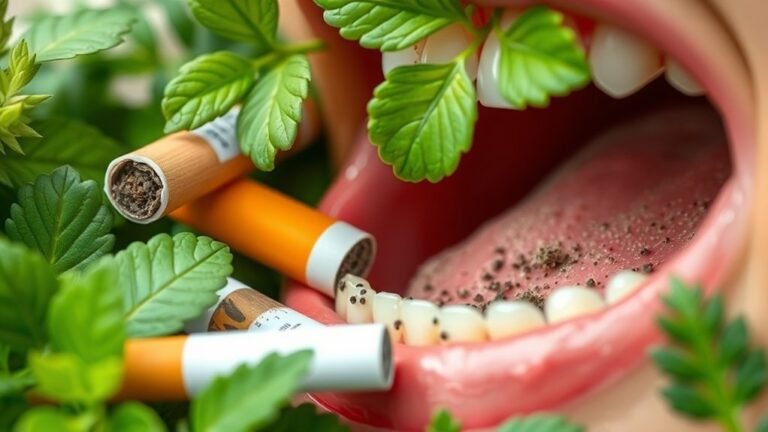Chronic Gum Disease Is Often Due to Persistent Microbial Imbalance
Chronic gum disease occurs when harmful bacteria outnumber beneficial ones in your mouth, leading to inflammation and damage to the tissues supporting your teeth. This microbial imbalance typically arises from poor oral hygiene, tobacco use, high sugar intake, and certain medical conditions. Signs include gum bleeding, bad breath, and gum recession. It’s essential to address these imbalances early to prevent severe outcomes. If you want to explore more about prevention and treatment options, further information is available.
Key Takeaways
- Chronic gum disease arises from a microbial imbalance, where harmful bacteria outnumber beneficial ones in the oral cavity.
- Plaque buildup leads to hardened deposits, triggering infections and inflammation in the gums.
- Poor oral hygiene, high sugar intake, and smoking are significant contributors to microbial imbalance.
- Inflammation resulting from microbial imbalance can cause tissue damage and potential tooth loss.
- Regular dental check-ups are essential for monitoring microbial composition and preventing chronic gum disease.
Understanding Chronic Gum Disease
Chronic gum disease, also known as periodontal disease, occurs when the tissues supporting your teeth become inflamed and damaged over time. This condition often arises from a microbial imbalance in your oral cavity, where harmful bacteria outnumber beneficial ones. When plaque accumulates and hardens, it leads to periodontal infections that can further exacerbate inflammation. As these infections progress, they can cause gum recession and even tooth loss if untreated. Key risk factors include poor oral hygiene, smoking, and certain medical conditions, which can all contribute to the persistence of harmful bacteria. Understanding these dynamics is essential for effective prevention and management of chronic gum disease, ensuring the maintenance of your overall oral health.
The Role of Oral Microbiome in Gum Health
The oral microbiome plays a significant role in maintaining gum health and can influence the development of chronic gum disease. A balanced oral microbiome contributes to the stability of the oral biofilm, which acts as a protective barrier against pathogenic bacteria. When this balance is disrupted, harmful microbes can proliferate, leading to inflammation of the gums. This inflammatory response can cause tissue damage and bone loss, ultimately resulting in chronic gum disease. Maintaining a healthy oral microbiome through proper oral hygiene and diet is essential for preventing the escalation of inflammation and ensuring gum health. Regular dental check-ups can also help monitor and manage the microbial composition within your mouth, promoting a balanced and healthy oral environment.
Factors Contributing to Microbial Imbalance
While maintaining a balanced oral microbiome is vital for gum health, several factors can disrupt this delicate equilibrium. Poor oral hygiene practices, such as infrequent brushing and flossing, allow pathogenic bacteria to flourish. Dietary choices, particularly high sugar intake, can promote harmful microbial growth. Additionally, smoking markedly alters the oral environment, weakening immune responses and enhancing bacterial colonization. Systemic conditions like diabetes and autoimmune diseases can also create favorable conditions for microbial imbalance, as they affect inflammatory responses and overall health. Moreover, certain medications, including antibiotics and corticosteroids, can inadvertently alter microbial populations, leading to dysbiosis. Recognizing these factors is important in preventing chronic gum disease and maintaining ideal oral health.
Signs and Symptoms of Gum Disease
Often, you might not notice the early signs of gum disease, as they can be subtle and easily overlooked. Initial symptoms often include gingival inflammation, characterized by redness and swelling of the gums. You may also experience bleeding during brushing or flossing, which is a significant indicator of periodontal issues. Bad breath, or halitosis, can develop as bacteria proliferate in the oral cavity. As the condition progresses, you might notice gum recession, where the tissue pulls away from the teeth, exposing more of the tooth structure. Additionally, increased tooth sensitivity or pain can occur, particularly when consuming hot or cold substances. Recognizing these signs early is essential for effective intervention and management of gum disease.
Prevention Strategies for Maintaining Oral Balance
Maintaining oral balance is essential for preventing gum disease and promoting overall dental health. To achieve this, you should adopt a rigorous oral hygiene routine, including brushing twice daily with fluoride toothpaste and flossing once a day to remove plaque and food particles. Additionally, consider using an antimicrobial mouthwash to reduce harmful bacteria. Regular dental check-ups every six months are vital for early detection of any issues and professional cleanings. A balanced diet rich in vitamins and minerals supports gum health, while limiting sugar intake reduces the risk of bacterial overgrowth. Staying hydrated helps maintain saliva flow, which naturally protects against microbial imbalance. By following these strategies, you can greatly reduce your risk of developing chronic gum disease.
Treatment Options for Chronic Gum Disease
When addressing chronic gum disease, you’ll encounter both non-surgical and surgical treatment options tailored to your specific condition. Non-surgical approaches often include scaling and root planing, while surgical options may involve procedures like flap surgery or bone grafts. Understanding these treatments is essential for effectively managing your gum health and preventing further complications.
Non-Surgical Approaches
Although chronic gum disease can lead to serious oral health issues, various non-surgical treatment options are available to manage and reverse its effects. Professional dental cleanings are vital, as they remove plaque and tartar buildup that contribute to inflammation. Antimicrobial mouth rinses can help reduce bacterial load, promoting healthier gums. Additionally, your dentist may recommend localized antibiotic treatment to target specific areas of infection. Regular monitoring and improved oral hygiene practices, including proper brushing and flossing techniques, are essential for maintaining gum health. Moreover, lifestyle modifications—such as quitting smoking and improving nutrition—can greatly enhance treatment outcomes. By incorporating these non-surgical approaches, you can effectively combat chronic gum disease and restore your oral health.
Surgical Treatment Options
Surgical treatment options are often necessary for managing chronic gum disease when non-surgical methods prove insufficient. One common procedure is flap surgery, where your dentist lifts the gums to remove tartar and bacteria, then repositions the gums for better health. Another option is bone grafting, which can restore lost bone tissue, enhancing tooth stability. Guided tissue regeneration may also be recommended, allowing for the growth of new bone and gum tissue. In severe cases, extraction of affected teeth might be necessary to prevent further complications. Each surgical approach aims to reduce infection, promote healing, and restore oral health, ensuring you maintain ideal function and aesthetics. Consulting with your dental professional will help determine the most effective treatment strategy for your specific condition.
The Importance of Regular Dental Check-ups
Regular dental check-ups are essential for maintaining oral health and preventing chronic gum disease. These visits allow for preventative care that can appreciably reduce the risk of severe periodontal issues. Additionally, early detection of any signs of gum disease enables prompt intervention, which is critical for effective treatment.
Preventative Care Benefits
While many people underestimate the importance of routine dental visits, these check-ups play a crucial role in preventing chronic gum disease. Regular dental examinations allow your dentist to assess your oral health, identifying potential issues before they escalate. During these visits, professional cleanings remove plaque and tartar buildup, which are primary contributors to gum disease. Your dentist can also provide personalized advice on oral hygiene practices tailored to your specific needs. Additionally, they can monitor any changes in your periodontal health over time, ensuring that any microbial imbalances are addressed promptly. By prioritizing preventative care, you greatly reduce your risk of developing chronic gum disease and maintain overall oral health, fostering healthier teeth and gums for the long term.
Early Detection Advantages
Understanding the importance of early detection can greatly impact your oral health outcomes. Regular dental check-ups allow for the identification of microbial imbalances before they escalate into chronic gum disease. Dentists can assess plaque buildup, inflammation, and other indicators that may signal early-stage periodontal issues. With timely intervention, you can prevent further tissue damage, tooth loss, and costly treatments down the line. Additionally, early detection enables targeted therapies tailored to your specific condition, enhancing the effectiveness of treatment. By maintaining consistent appointments, you empower your dental professional to monitor changes and provide evidence-based recommendations, ultimately safeguarding your oral health and overall well-being. Don’t underestimate the role of preventive care in achieving ideal dental health.
Frequently Asked Questions
Can Chronic Gum Disease Affect Overall Health Beyond Oral Issues?
Yes, chronic gum disease can negatively impact your overall health. It’s linked to conditions like heart disease and diabetes, as inflammation and bacteria from your gums can enter the bloodstream, affecting your systemic health.
What Is the Link Between Diet and Oral Microbial Balance?
Your diet acts as a symphony for oral microbial balance; nutrients nourish beneficial bacteria while sugar and processed foods fuel harmful ones. A balanced diet maintains harmony, supporting overall oral health and preventing microbial imbalances.
Are Certain Medications Linked to Gum Disease?
Yes, certain medications, including antihistamines, antidepressants, and blood pressure drugs, can lead to gum disease. They often cause dry mouth, reducing saliva flow, which is essential for maintaining oral health and microbial balance.
How Does Stress Impact Gum Health and Microbial Balance?
Stress can weaken your immune system, leading to inflammation and disrupting microbial balance in your mouth. This imbalance may contribute to gum disease, making it essential to manage stress for maintaining ideal gum health and overall well-being.
Can Genetics Influence Susceptibility to Chronic Gum Disease?
Yes, genetics can influence your susceptibility to chronic gum disease. Certain genetic factors may affect immune responses, inflammatory reactions, and microbial interactions in your mouth, making you more vulnerable to developing periodontal issues over time.
Conclusion
In summary, understanding the persistent microbial imbalance that leads to chronic gum disease is vital for effective prevention and treatment. Did you know that nearly 70% of adults over 30 have some form of gum disease? This statistic underscores the importance of maintaining oral health and seeking regular dental check-ups. By addressing risk factors and recognizing early signs, you can help preserve your gum health and avoid the complications associated with advanced periodontal disease.






